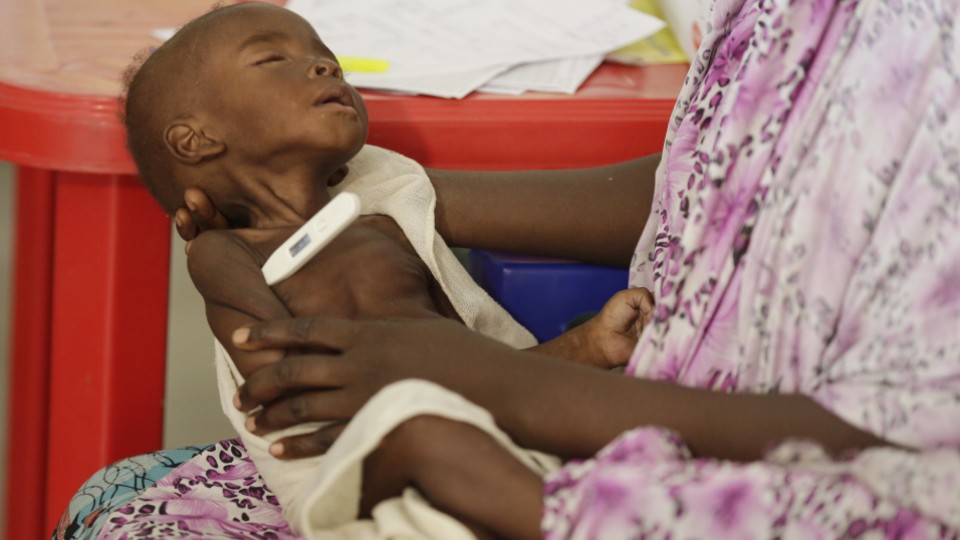Imagine catching fish. You reel the fish in, bring it onto your boat and take it home where you also grow crops.
Day after day, you are self-sufficient. You can keep feeding yourself and your family because of easily accessible food. Then one day an insurgency comes. You have to leave home. You go to a camp where the inhabitants are provided with locally grown food. Where once you ate several meals a day, you now have to wait for days without food in between ration deliveries to the camp. This is the reality for Aboubaccar, an internally displaced person (IDP) at a camp in Borno state, Nigeria, as reported by the United Nation’s World Food Programme (WFP). He has 13 children to feed.
This is also the reality for 4.4 million people in northeast Nigeria who have been affected by food insecurity, a situation so severe the United Nations expects 75,000 children to die within the next few months if they do not receive proper treatment for malnutrition.
The lack of food affects children more than any other age group. When Dr Joanne Liu and Dr Natalie Roberts of Doctors without Borders (MSF) went to Nigeria earlier this year, they were astounded by how few children under the age of five were to be seen. “Almost none,” they reported in a piece for Time as they wandered through Borno state. The children were gone, having starved to death from malnutrition.
Malnutrition is a condition which “occurs when a person’s diet doesn’t contain the right amount of nutrients.” This can lower immune resistance to disease.
“A malnourished child is nine times more likely to die from another illness such as malaria or pneumonia or diarrhoea,” Doune Porter, the UNICEF Chief of Communication in Nigeria, told TRT World.
“(Children under five) are the most vulnerable to malnutrition and most likely to suffer consequences, and permanent consequences, because this is a time of great development for children,” Porter added.
“Poverty, armed conflict, irregular rainfall and high unemployment in parts of Nigeria contribute to high levels of food insecurity and chronic malnutrition,” the United States Agency for International Development (USAID) said on its Nigeria factsheet.
The primary region of farming has always been in northeastern Nigeria. Agriculture there has been disrupted by the Boko Haram insurgency that has been brewing in the region since 2009. Boko Haram, headquartered in the northeastern city of Maiduguri, is the armed group responsible for the massacres of thousands of civilians and for the kidnapping of 276 Chibok school girls in 2014.
“The violence increased dramatically around 2013 […] because of the violence, farmers were not able to plant. In many cases, people fled their homes and had to leave their food stores behind. And of course [they] did not have access to agricultural land,” said Porter.
The damage in the region is cumulative, Porter confirmed: “Between violence and reduced food seeds, this year we are actually in a situation where a couple of months ago there were pockets of 65,000 people living in famine.”
The food crisis in the area has even driven Boko Haram into neighbouring Cameroon to look for food.
“Farmers [have been] unable to cultivate their land for several years,” said Adel Sarkozi, the West African regional communication officer for WFP. “[It is] difficult to reach people in need due to insecurity and remote location.”
The issue of not having access to conflict-affected areas compounds the problem. “There are vast areas in Borno state which are the worst of the affected and are completely inaccessible. We have no idea what is happening to people there,” Porter said.
Aid trucks attempting to enter such areas have not been able to deliver food. The UN reported aid trucks going into conflict-hit areas as being ambushed by suspected Boko Haram fighters, leading them to temporarily suspend operations earlier this year.
Another contribution to the food insecurity is economic instability in the region, according to the WFP. Commodity prices have soared due to a weak currency, making food unaffordable.
Aid agencies in the area have attempted to mitigate the shortage by sending food to those who do not have enough.
The WFP also sends cash-based assistance to areas where markets are functioning, according to Sarkozi. The humanitarian body also makes use of air transport to carry assistance, provides special nutritious food for children under five, and works “with UNICEF to deliver a holistic package of essential health and nutrition services to prevent and treat acute malnutrition, and address its underlying causes,” Sarkozi said.
In order for aid agencies to carry on providing food and treatment for those affected by malnutrition, there needs to be a cash flow. The Nigerian branch of UNICEF (United Nations Children’s Fund) is massively underfunded, for example.
“Our funding appeal is for $115 million. We have under $40,000,” Porter said.
With the government focusing currently on freeing areas of Borno state from Boko Haram rather than feeding civilians, the situation in northeastern Nigeria is dire. According to Porter, the civilians who are relocated are “barely hanging on for life.” For the people of Borno state, priorities are different: food before peace. With funding running low, however, that hope seems far from being fulfilled.
TRT

